Letter writing can be a powerful tool for managing anxiety. It gives you a safe space to express emotions and untangle chaotic thoughts. By articulating your feelings, you can gain clarity and insight into the triggers behind your anxiety. Writing allows you to process experiences without judgment, promoting emotional regulation and self-reflection. This structured approach can reduce the intensity of anxious thoughts and help you feel more in control. Plus, revisiting your letters can remind you of personal growth and progress. Discover how letter writing can release your inner strength and provide further benefits.
Understanding Anxiety and Its Impact
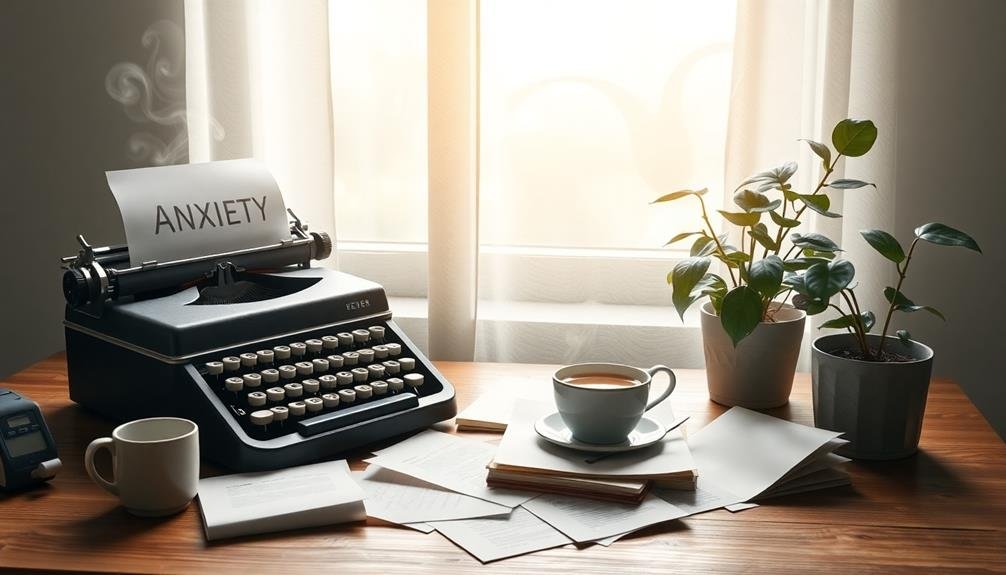
Anxiety can often feel overwhelming, especially when it disrupts your daily life. You might find yourself caught in a cycle of worry, which can affect your concentration, relationships, and overall well-being. Physical symptoms like racing heartbeats, sweating, or fatigue may accompany your anxious thoughts, making it hard to focus on anything else.
Understanding anxiety is the first step toward managing it. You may notice that triggers vary from person to person; for some, it's social situations, while for others, it could be work-related stress. Recognizing your unique triggers is essential for developing coping strategies that work for you.
Anxiety also has a way of distorting your perception of reality. You might feel trapped in your own mind, believing that certain situations are far worse than they actually are. This heightened sense of fear can lead to avoidance behaviors, limiting your experiences and opportunities.
The impact of anxiety can ripple through various aspects of your life, affecting your ability to enjoy everyday activities. Acknowledging its presence and understanding its effects can empower you to take actionable steps toward reclaiming your peace of mind.
The Therapeutic Benefits of Writing
Writing can serve as a powerful outlet for processing emotions and thoughts, especially when anxiety feels overwhelming. When you put pen to paper, you create a safe space to explore your feelings without judgment. This act of writing allows you to articulate what's troubling you, giving clarity to your thoughts. You can express frustrations, fears, or even moments of joy, which can be incredibly cathartic.
By writing regularly, you develop a better understanding of your triggers and the patterns behind your anxiety. You might notice recurring themes or specific situations that cause distress. This awareness can empower you to confront those issues head-on, rather than letting them simmer beneath the surface.
Moreover, the physical act of writing can be soothing. It engages your mind and helps ground you in the present moment, providing a break from anxious spirals. You might find that journaling or free writing serves as a form of meditation, allowing your mind to settle.
In short, writing offers a unique therapeutic benefit, transforming your anxiety into something tangible and manageable, paving the way for healing and self-discovery.
Letter Writing as a Coping Mechanism
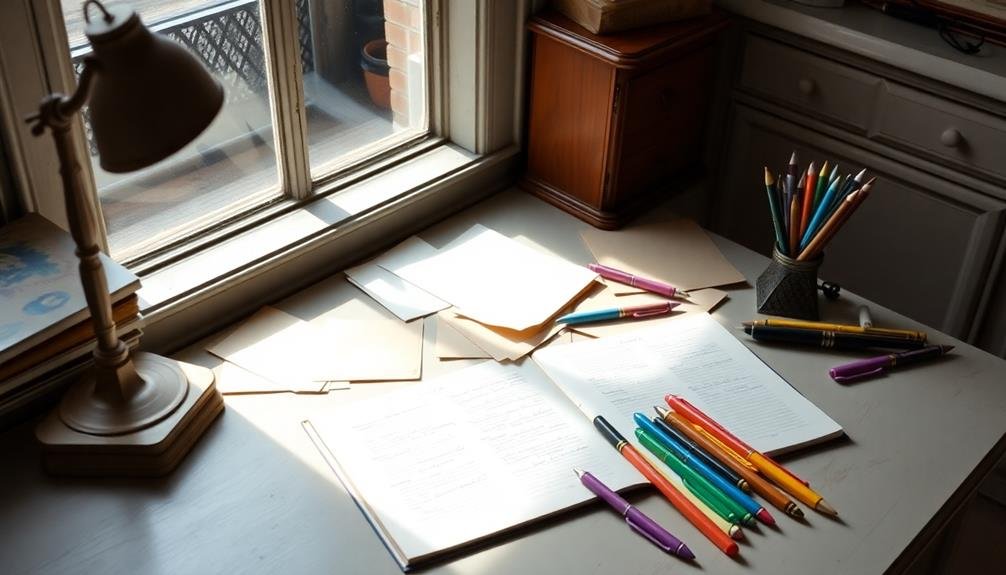
Sometimes, pouring your thoughts into a letter can be a powerful way to cope with overwhelming emotions. When life's pressures feel too heavy, writing a letter allows you to express your feelings without judgment. You can address it to anyone—or even just to yourself. This act of writing can help you clarify your thoughts and process your emotions, turning chaos into something tangible.
As you write, you give yourself permission to be honest. You can explore your fears, frustrations, or sadness, and in doing so, you can create space for healing. The physical act of writing can be therapeutic. It engages your mind and body, helping you to focus on what's bothering you rather than being consumed by it.
You might find that once you've put your feelings on paper, you feel lighter. This release can be an essential step in managing anxiety.
Plus, you can revisit your letters whenever you need a reminder of your journey. So, grab a pen and paper, or open a digital document. Let your thoughts flow freely, and you'll discover just how empowering letter writing can be as a coping mechanism.
How Expressive Writing Works
Expressive writing can be a powerful tool for you to boost emotional regulation and enhance self-reflection.
As you put your thoughts on paper, you'll find that it promotes cognitive clarity, helping you better understand your feelings and experiences.
This process not only eases anxiety but also fosters personal growth.
Boosts Emotional Regulation
While many struggle to articulate their feelings, engaging in expressive writing can considerably enhance emotional regulation. By putting pen to paper, you create a safe space to explore and process your emotions. This practice helps you identify your feelings more clearly, allowing you to respond rather than react to emotional triggers.
Here's how expressive writing affects emotional regulation:
| Aspect | Benefit | Outcome |
|---|---|---|
| Emotional Awareness | Increases understanding of emotions | Better response to situations |
| Stress Reduction | Lowers anxiety levels | Improved mental well-being |
| Clarity of Thoughts | Organizes chaotic thoughts | Enhanced decision-making |
When you write about what you're feeling, you externalize those emotions, which can reduce their intensity. You're not just thinking about your feelings; you're giving them a voice. This act of expression allows you to distance yourself from overwhelming emotions, making it easier to manage them. So, next time you're feeling anxious, try writing it down. You might be surprised at how much clarity and control you gain over your emotional landscape.
Enhances Self-Reflection
Writing can spark a deeper understanding of yourself, allowing you to reflect on your thoughts and experiences more meaningfully. When you put pen to paper, you create a space to explore your emotions without judgment. This process encourages you to investigate your feelings, helping you identify patterns and underlying issues that may contribute to your anxiety.
As you write, you're not just documenting events; you're interpreting them. You might discover connections between your experiences and your emotional responses. This realization can lead to insights that help you recognize triggers and develop healthier coping mechanisms. By writing regularly, you can track your progress and observe how your thoughts evolve over time.
Moreover, expressing your thoughts in a letter allows you to communicate with yourself. You can ask questions and seek answers, fostering a dialogue that promotes self-awareness. This practice encourages you to confront uncomfortable feelings, making it easier to process and understand them.
Ultimately, enhancing self-reflection through letter writing empowers you. You gain clarity about who you are, what you feel, and why you react the way you do, leading to personal growth and a more balanced emotional state.
Promotes Cognitive Clarity
Enhancing self-reflection lays the groundwork for cognitive clarity, making it easier to untangle complex thoughts and emotions. When you engage in letter writing, you're not just putting words on paper; you're actively processing your experiences. This practice helps you articulate feelings that might otherwise remain tangled in your mind. As you express yourself, you'll often find that the act of writing leads to new insights and understandings.
By organizing your thoughts in a structured format, you create a clearer mental map of your feelings. You might start with a jumble of emotions, but as you write, you'll notice patterns and connections emerging. This clarity can reduce anxiety, as you're no longer wrestling with vague feelings. Instead, you're confronting specific thoughts that you can work through.
Moreover, letter writing allows you to step back and view your situation from a different perspective. This distance can help you identify solutions or coping strategies you hadn't considered before.
Ultimately, the combination of self-reflection and expressive writing promotes cognitive clarity, empowering you to face your anxiety head-on with a clearer understanding of your inner world.
Connecting With Emotions Through Letters

Letters act as a bridge between your thoughts and feelings, allowing you to explore your emotions in a safe, structured way. When you put pen to paper, you're not just communicating; you're engaging in a dialogue with yourself. This process helps you uncover feelings that might be buried under anxiety or stress. By articulating your emotions, you gain clarity and insight into what's truly affecting you.
Here's a simple table to visualize how letter writing can connect you with your emotions:
| Emotion | Trigger | Reflection |
|---|---|---|
| Anxiety | Upcoming deadline | "I feel overwhelmed and rushed." |
| Sadness | A lost friendship | "I miss our connection." |
| Frustration | Daily routine | "I need a change." |
Each time you write, you create an opportunity to confront these emotions head-on. Writing allows you to label your feelings, understand their origins, and process them more effectively. This connection with your emotions fosters self-awareness, empowering you to respond to your anxiety with greater understanding and compassion.
Enhancing Mindfulness and Reflection
When you write a letter, you can cultivate present-moment awareness by focusing on your thoughts and feelings as they arise.
This process allows you to explore your emotions more deeply and organize them in a way that makes sense to you.
Cultivating Present-Moment Awareness
Although anxiety can often pull you into the future or dwell on the past, cultivating present-moment awareness can ground you in the here and now. Letter writing is a powerful tool for enhancing this awareness. When you sit down to write, you focus on your current thoughts and feelings, allowing you to anchor yourself in the moment.
As you put pen to paper, pay attention to the sensations you experience—the texture of the paper, the weight of the pen, and the rhythm of your handwriting. This practice draws your attention away from anxious thoughts and places it firmly in the present. You'll find that by expressing yourself in writing, you can observe your surroundings and feelings without judgment.
Consider writing about something you see or hear right now. What colors are in your environment? What sounds fill the air? By engaging your senses, you enhance your mindfulness and create a space for reflection.
This process not only reduces anxiety but also enriches your understanding of yourself. By regularly practicing present-moment awareness through letter writing, you can cultivate a deeper sense of peace and clarity in your daily life.
Exploring Emotions Through Writing
Exploring your emotions through writing can be a transformative experience, as it allows you to dive deep into your feelings and uncover insights that might otherwise remain hidden. When you put pen to paper, you create a safe space to express your thoughts without judgment. This practice encourages you to slow down and truly connect with what you're feeling.
As you write, you may find that emotions you didn't even recognize bubble to the surface. This process fosters mindfulness, helping you to acknowledge and accept your feelings rather than push them away. You might discover patterns in your emotions, gaining clarity on what triggers anxiety or joy in your life.
Writing also serves as a powerful tool for reflection. By revisiting what you've penned down, you can see your emotional journey laid out before you, making it easier to understand and process.
Through this exploration, you cultivate a deeper awareness of yourself, allowing you to respond to your feelings with compassion and understanding. So, grab a journal, and start writing. You'll be surprised at how much you can learn about yourself through this simple yet profound act.
Organizing Thoughts and Feelings
After you've begun to explore your emotions through writing, the next step is organizing those thoughts and feelings. This process helps you gain clarity and a deeper understanding of what's happening in your mind.
Start by reviewing what you've written and identifying recurring themes or emotions. Are there specific situations that trigger anxiety? Do certain people or events consistently come up?
Next, categorize these thoughts. You might create sections for worries, hopes, and reflections. This organization not only makes it easier to see patterns, but it also allows you to address each concern more systematically.
Once categorized, consider writing letters to different parts of yourself or the situations that cause distress. For instance, a letter to your anxious self can offer comfort and reassurance, while a letter to your future self can outline your goals and aspirations.
Building Self-Compassion and Acceptance
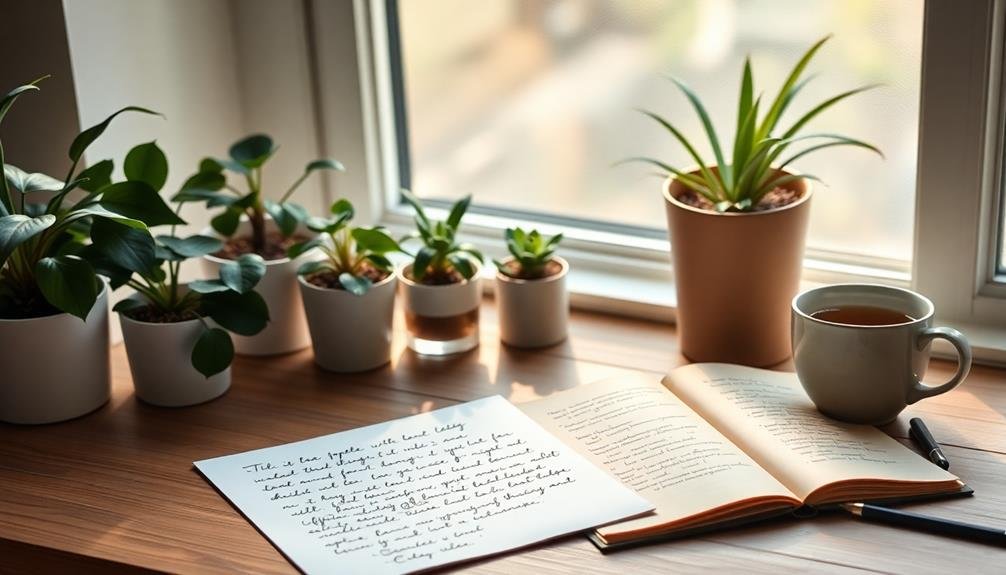
Building self-compassion and acceptance is a crucial step in managing anxiety. When you cultivate kindness toward yourself, it becomes easier to navigate the challenges that anxiety brings. Instead of harshly judging your feelings or experiences, you can learn to embrace them with understanding. Acknowledge that everyone struggles at times, and it's okay to feel anxious or overwhelmed.
Writing letters to yourself can be a powerful tool in this process. As you write, express your feelings without criticism. Share your fears and anxieties, but also remind yourself of your strengths and achievements. This practice helps you develop a more compassionate inner dialogue, allowing you to accept your flaws and imperfections.
When you practice self-compassion, you create a safe space for growth. You start to recognize that your worth isn't tied to your anxiety or any perceived failures. Instead, you learn to accept yourself as you are, which can greatly decrease anxiety's hold on you.
Embracing this journey of self-acceptance will empower you, making it easier to face life's challenges with resilience and grace. Remember, you're not alone in this; many people share similar struggles.
Practical Tips for Effective Letter Writing
Effective letter writing can be a transformative way to confront and manage anxiety. To make your letter writing process more effective, consider these practical tips:
- Set a Comfortable Space: Find a quiet and comfortable spot where you can focus. This helps create a calming atmosphere that encourages free expression.
- Be Honest and Open: Write as if you're talking to a trusted friend. Don't hold back your emotions; honesty is key to getting your feelings out.
- Use Prompts If Needed: If you're unsure where to start, use prompts like "What's bothering me today?" or "What do I wish I could change?" This can guide your thoughts and make writing easier.
- Don't Worry About Perfection: Remember, this is for you, not anyone else. Spelling or grammar doesn't matter. Just let your thoughts flow without self-judgment.
Personal Stories of Transformation

Many individuals have found that writing letters can lead to profound personal transformation in managing anxiety. You might connect with stories like that of Sarah, who struggled with overwhelming stress. She started writing letters to herself, pouring out her fears and insecurities. Over time, this practice helped her gain clarity and perspective, allowing her to confront issues that previously felt insurmountable.
Then there's Mark, who faced social anxiety. He began writing letters to friends he hadn't spoken to in years. As he expressed his thoughts and feelings on paper, he found it easier to reach out in person. Each letter became a stepping stone toward rebuilding relationships, ultimately easing his anxiety.
You may also resonate with Emma's experience. She frequently wrote letters to her anxiety, addressing it directly. By personifying her feelings, she created a dialogue that diminished their power over her. This simple act transformed her mindset from one of fear to empowerment.
These personal stories illustrate that letter writing isn't just a creative outlet; it's a powerful tool for self-discovery and healing. You, too, can initiate your own transformative journey through the written word.
Frequently Asked Questions
Can Letter Writing Help Reduce Anxiety in Children?
Yes, letter writing can help reduce anxiety in children. It allows them to express their feelings, process thoughts, and communicate worries. This creative outlet fosters emotional release, boosting their confidence and promoting mental well-being.
What Types of Letters Should I Write for Anxiety Relief?
You can write letters to yourself, expressing feelings and thoughts. Consider gratitude letters, addressing loved ones, or even unsent letters to release emotions. Each type helps you process and alleviate anxiety effectively.
How Long Should I Spend Writing Letters for Anxiety?
You should spend about 15 to 30 minutes writing letters. This timeframe allows you to express your thoughts without feeling overwhelmed. Just focus on your feelings, and let the words flow naturally.
Is It Beneficial to Send Letters or Keep Them Private?
Sending letters can create connections and provide relief, while keeping them private allows for introspection and self-discovery. You'll find benefits either way; it depends on what feels right for you in that moment.
Can Digital Letter Writing Be as Effective as Handwritten Letters?
Digital letter writing can be just as effective as handwritten letters. You can express your thoughts and feelings clearly, and the convenience of technology might even encourage you to write more frequently and honestly.
In Summary
Incorporating letter writing into your routine can be a powerful tool for managing anxiety. By expressing your thoughts and feelings on paper, you create a safe space for reflection and self-discovery. This practice not only enhances mindfulness but also fosters self-compassion. As you connect with your emotions, you'll likely find a sense of relief and clarity. So grab a pen, let your thoughts flow, and watch how this simple act transforms your mental well-being.



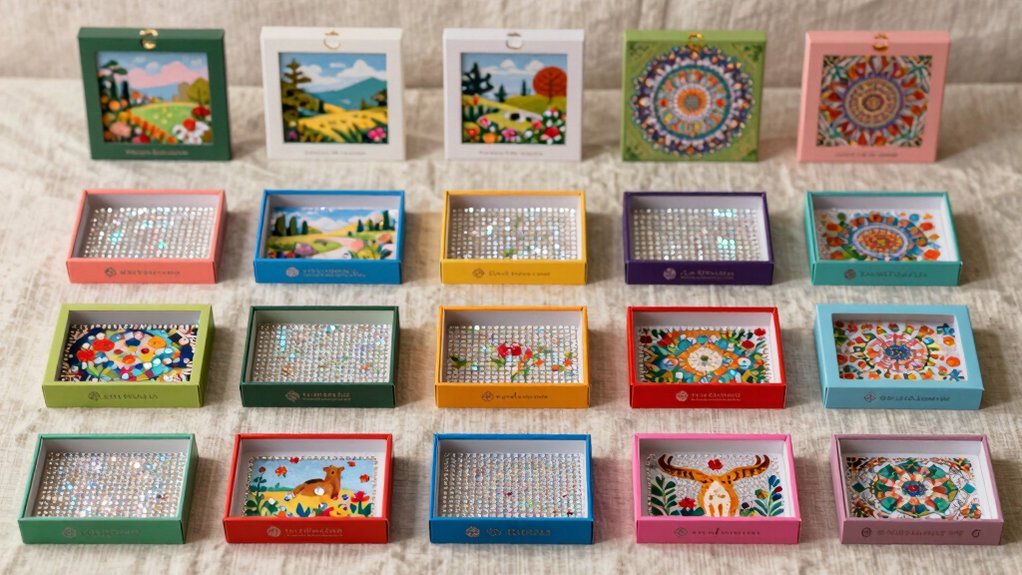
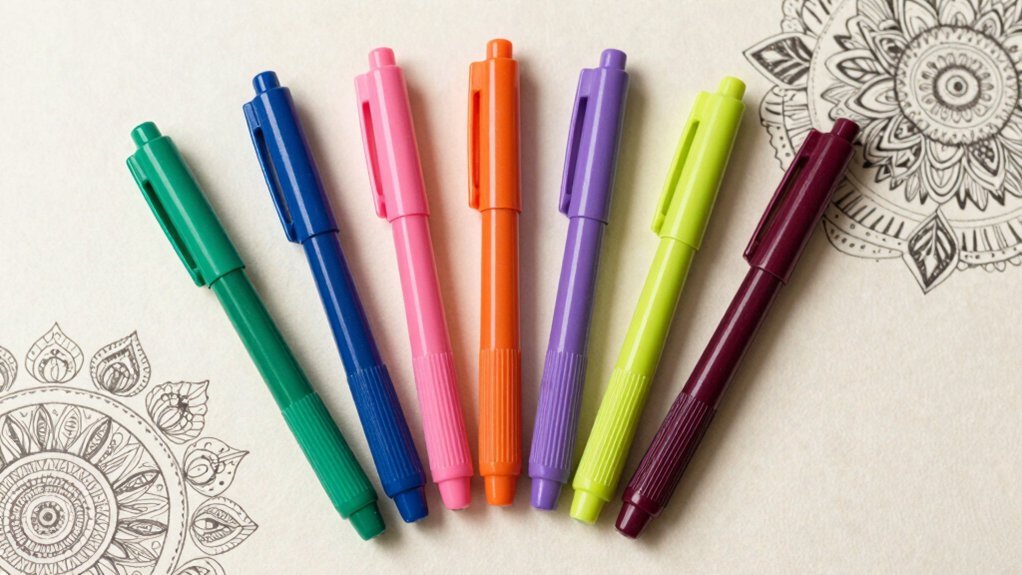
Leave a Reply